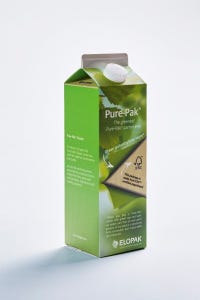Elopak will soon become the first company to launch beverage cartons with second-generation renewable coatings on the European market, thanks to a unique partnership with Sabic.
March 10, 2015
Elopak will soon become the first company to launch beverage cartons with second-generation renewable coatings on the European market, thanks to a unique partnership with Sabic.
 Sabic is the first petrochemicals company to be able to produce renewable, second-generation polyethylene (PE) and polypropylene (PP) which, while using a totally renewable feedstock, is not in competition with the food chain. The products are certified under the ISCC Plus certification scheme and are made to the same specification as existing PE and PP products. Sabic developed its renewable polyolefin product range last year, in recognition of the growing importance consumers are placing on sustainable packaging, as well as the competitive nature of the industry.
Sabic is the first petrochemicals company to be able to produce renewable, second-generation polyethylene (PE) and polypropylene (PP) which, while using a totally renewable feedstock, is not in competition with the food chain. The products are certified under the ISCC Plus certification scheme and are made to the same specification as existing PE and PP products. Sabic developed its renewable polyolefin product range last year, in recognition of the growing importance consumers are placing on sustainable packaging, as well as the competitive nature of the industry.
"Sabic is committed to sustainability, and we recognize its importance to Elopak and Elopak's customers," said Rob Balk, Segment Leader, Extrusion Coating. "Consumers are becoming more and more environmentally conscious and it is great to be able to support these values and offer innovative solutions."
The renewable polyethylene that Sabic is supplying to Elopak--Sabic LDPE nExCoat5--directly addresses the plastic packaging industry's growing demand for high-performance extrusion coating films.
"The carton is the renewable choice for packaging of beverages, and with renewable polymers from Sabic, we are able to supply packaging that is virtually 100% renewable," says Kristian Hall, Director, Corporate Environment, Elopak. "This helps us continue on our journey to replace all fossil-based raw materials with renewable alternatives, as part of our Future Proofed Packaging Strategy."
The new coating is a milestone in Elopak's efforts to reduce the carbon footprint of its products, and strengthens the carton's position as having the lowest carbon footprint among liquid food packaging.
"We have a vision to deliver products with zero net impact on the environment, and this is an important step toward that goal," Hall continued.
Sabic is confident that the market for renewable packaging will continue to grow from year to year.
About the Author(s)
You May Also Like


